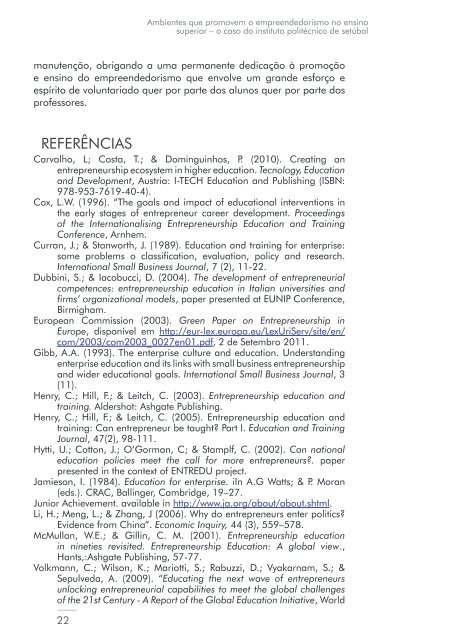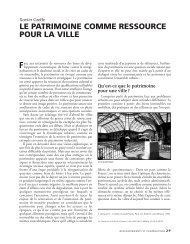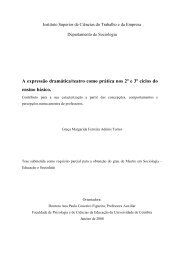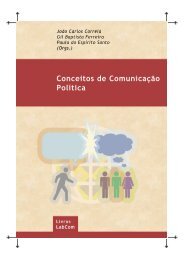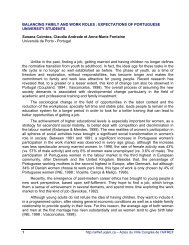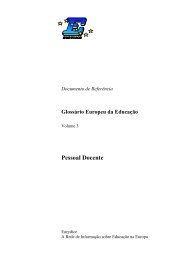Pedagogia no Ensino Superior (18) - ESEC
Pedagogia no Ensino Superior (18) - ESEC
Pedagogia no Ensino Superior (18) - ESEC
You also want an ePaper? Increase the reach of your titles
YUMPU automatically turns print PDFs into web optimized ePapers that Google loves.
Ambientes que promovem o empreendedorismo <strong>no</strong> ensi<strong>no</strong><br />
superior – o caso do instituto politécnico de setúbal<br />
manutenção, obrigando a uma permanente dedicação à promoção<br />
e ensi<strong>no</strong> do empreendedorismo que envolve um grande esforço e<br />
espírito de voluntariado quer por parte dos alu<strong>no</strong>s quer por parte dos<br />
professores.<br />
REFERÊNCIAS<br />
Carvalho, L; Costa, T.; & Dominguinhos, P. (2010). Creating an<br />
entrepreneurship ecosystem in higher education. Tec<strong>no</strong>logy, Education<br />
and Development, Austria: I-TECH Education and Publishing (ISBN:<br />
978-953-7619-40-4).<br />
Cox, L.W. (1996). “The goals and impact of educational interventions in<br />
the early stages of entrepreneur career development. Proceedings<br />
of the Internationalising Entrepreneurship Education and Training<br />
Conference, Arnhem.<br />
Curran, J.; & Stanworth, J. (1989). Education and training for enterprise:<br />
some problems o classification, evaluation, policy and research.<br />
International Small Business Journal, 7 (2), 11-22.<br />
Dubbini, S.; & Iacobucci, D. (2004). The development of entrepreneurial<br />
competences: entrepreneurship education in Italian universities and<br />
firms’ organizational models, paper presented at EUNIP Conference,<br />
Birmigham.<br />
European Commission (2003). Green Paper on Entrepreneurship in<br />
Europe, disponível em http://eur-lex.europa.eu/LexUriServ/site/en/<br />
com/2003/com2003_0027en01.pdf, 2 de Setembro 2011.<br />
Gibb, A.A. (1993). The enterprise culture and education. Understanding<br />
enterprise education and its links with small business entrepreneurship<br />
and wider educational goals. International Small Business Journal, 3<br />
(11).<br />
Henry, C.; Hill, F.; & Leitch, C. (2003). Entrepreneurship education and<br />
training. Aldershot: Ashgate Publishing.<br />
Henry, C.; Hill, F.; & Leitch, C. (2005). Entrepreneurship education and<br />
training: Can entrepreneur be taught? Part I. Education and Training<br />
Journal, 47(2), 98-111.<br />
Hytti, U.; Cotton, J.; O’Gorman, C; & Stamplf, C. (2002). Can national<br />
education policies meet the call for more entrepreneurs?. paper<br />
presented in the context of ENTREDU project.<br />
Jamieson, I. (1984). Education for enterprise. iIn A.G Watts; & P. Moran<br />
(eds.). CRAC, Ballinger, Cambridge, 19–27.<br />
Junior Achievement. available in http://www.ja.org/about/about.shtml.<br />
Li, H.; Meng, L.; & Zhang, J (2006). Why do entrepreneurs enter politics?<br />
Evidence from China”. Eco<strong>no</strong>mic Inquiry, 44 (3), 559–578.<br />
McMullan, W.E.; & Gillin, C. M. (2001). Entrepreneurship education<br />
in nineties revisited. Entrepreneurship Education: A global view.,<br />
Hants,:Ashgate Publishing, 57-77.<br />
Volkmann, C.; Wilson, K.; Mariotti, S.; Rabuzzi, D.; Vyakarnam, S.; &<br />
Sepulveda, A. (2009). “Educating the next wave of entrepreneurs<br />
unlocking entrepreneurial capabilities to meet the global challenges<br />
of the 21st Century - A Report of the Global Education Initiative, World<br />
22


